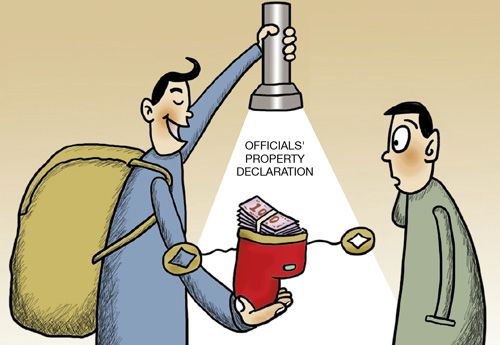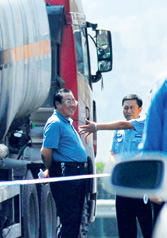|
 |
|
(CFP) |
 |
|
UNDER FIRE: "Watch Uncle" Yang Dacai (left), an official in northwest China's Shaanxi Province, grins in a now-infamous photo of a bus crash on August 26 (LI YIBO) |
Yang Dacai never thought he would be vilified by the public, but his taste for expensive watches became the target of outrage on the Internet.
It started with a picture: 55-year-old Yang, head of the Bureau of Work Safety of northwest China's Shaanxi Province, grins in front of the wreckage of a double-decker sleeper bus that rammed into a methanol-loaded tanker on August 26. Thirty-six people died.
The picture triggered an online manhunt when it was posted. Yang was soon identified and was widely criticized for being rough-hearted toward the deceased. Unexpectedly, netizens also took photographic inventory of the accessories Yang had been seen wearing at public events in the following days.
Yang was found to own at least five luxury watches of brands including Rolex, Mont Blanc and Radar seen in pictures of Yang on other occasions. Netizens also identified his bracelets and glasses as considerably expensive.
How could a provincial bureau head afford all these expensive items? Calls grew for supervisory departments to launch a corruption investigation.
On August 29, Yang faced hordes in a live chat on Weibo, China's answer to Twitter, saying the reason for his grin at the scene of the accident was to raise morale. He claimed his watches were purchased with own income and that he often swaps watches with his son, who Yang said shares his affection for pricey timepieces.
Yang may have been one of the first government officials to use social media to handle a public relations crisis, but it wasn't enough for netizens. On August 30, photographs of Yang wearing four other watches appeared online. The Shaanxi Provincial Commission for Discipline Inspection of the Communist Party of China (CPC) started investigating Yang on the same day, saying Yang would be punished if he is found to have committed corruption.
Morris Gao, a respected watch expert with the online Watchstore Forum (watchstore.com.cn) said that conservative estimates place the nine watches together at a cost of more than 300,000 yuan ($47,460). "Owning such a collection of luxury watches seems over the top for a government official," Gao said.
"It drew the attention of so many people because more people are concerned about the transparency of officials' assets," said Sun Duofei, COO at 5lux.com, a Chinese website that sells luxury products.
"Most Web users do not really care about the actual number or value of these watches," watch connoisseur and blogger Huazong told the Beijing-published Global Times. "What they need is just a channel to vent their anger over corruption."
Huazong, a businessman in Shenzhen, southern Guangdong Province, started compiling photographs of the fancy watches worn by officials in July 2011. Since then, Huazong has appraised the timepieces of more than 300 officials and found that many of them had more than three famous-brand watches. His enthusiasm waned after eliciting only one official reply after 90 posts.
"Currently, most officials report the details of their assets only to the authorities, a method that has already proven to be ineffective," said Wang Quanjie, a deputy to the National People's Congress (NPC), China's top legislature, in 2003-08 and a professor at Yantai University in eastern Shandong Province. Wang has campaigned for the publication of officials' assets since 2004.
The Chinese Government and the CPC Central Committee issued two regulations in 1995 and 2001, requiring officials to declare their income. But the reports were limited to officials' salary and subsidies, with the information unavailable to the public or the media.
That changed on January 1, 2009, when the local government of Altay Prefecture in northwestern Xinjiang Uygur Autonomous Region announced that the incomes of more than 1,000 county and district officials would be posted online annually starting that year.
Altay is the first region in China to show officials' income and assets to the public. Wu Weiping, Secretary of the Altay Prefectural Commission for Discipline Inspection of the CPC, initiated the program. "The aim is clear and simple—to put official's personal assets under supervision to prevent corruption," Wu said.
| 